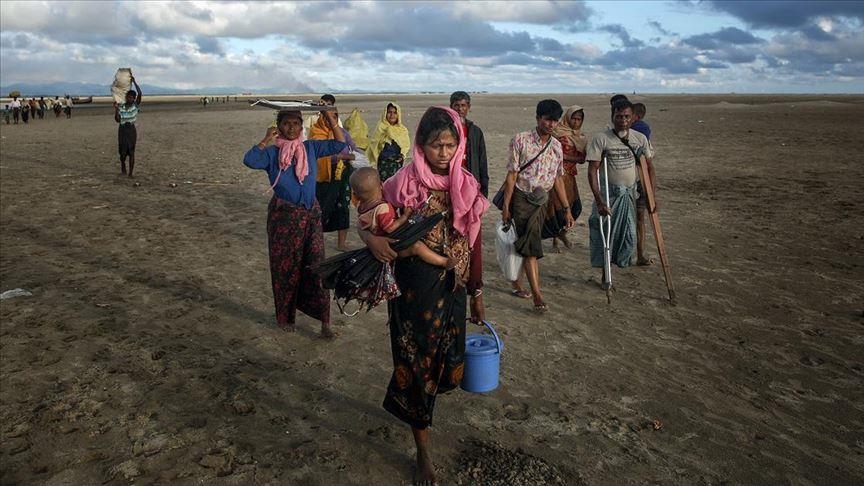Panel discuss Rohingya future following Myanmar coup
Academics, journalists, politicians urge sanctions, embargo against military leaders

LONDON
A panel of experts convened on Friday to discuss the future of Rohingya Muslims in Myanmar following a military coup there last month.
The online discussion was hosted by the Centre for British-Turkish Understanding in collaboration with the Justice For Rohingya Minority group and the Burma Human Rights Network and hosted by prominent figures, including Labour MP Rushnara Ali, academics Penny Green, Ronan Lee and activist Kyaw Win.
Panelists noted the lack of concern from the international community regarding the plight of Rohingya Muslims following the military coup on Feb. 1 despite support for the civil disobedience campaign against coup leaders by civilians in major urban centers.
“It is essential now more than ever that we continue raising awareness in the international community of the plight of the Rohingya people in Myanmar now that the military are back in power and are cracking down on pro-democracy groups,” said Kyaw Win, head of the Burma Human Rights Network. “The international community are right to denounce the coup and the violent response to demonstrations by the military and police forces but they shouldn’t forget that the Rohingya are still being persecuted and that this oppression could worsen in the coming months if no serious action is taken.”
The group also mulled possible responses to the coup and what effective action could be taken by the UN and world powers to reign in military leaders of the south-east Asian state before further gross violations of human rights continues.
International sanctions and an arms embargo regime is a tactic that was debated and it was argued that the move would put a strain on the military’s ability to maneuver within domestic and regional circles and could potentially isolate it on the international stage, depriving it of much needed economic investment.
“An arms embargo is imperative if we are to prevent any further deaths at the hands of the Myanmar military but it would also prevent them from elevating their hostile campaign against the Rohingya Muslims who have suffered at their hands for so long. They (the Rohingya) now face an even more uncertain future with the military back at the helm,” according to Labour MP Rushnara Ali.
Asked if the Rohingya situation would improve if the military were to return power to former State Counsellor Aung San Suu Kyi and her National League for Democracy (NLD), the prominent activist argued that under NLD rule, atrocities were being carried out by the military against the Rohingya and Suu Kyi defended the military against accusations of genocide.
“We were disappointed that the NLD didn’t denounce the military in its genocidal campaign against the Rohingya, rather on the contrary, they supported them and denied any allegations of ethnic cleansing. But of course we, as human beings in the right conscience, are unhappy with the manner Aung San Suu Kyi has been treated as well as members of her party and wider anti-coup demonstrations,” said Dr. Anita Schug, co-founder of the Rohingya Medics Organisation.
Schug explained in great detail how Suu Kyi’s silence, as well as inaction on the NLD’s behalf, contributed to the mass expulsion of hundreds of thousands to Bangladesh who now reside in camps that are inadequate and unsafe. The Rohingya who remain in Myanmar are “severely persecuted and restricted” by authorities but also by extremist Buddhist groups.
The Myanmar military overthrew Aung San Suu Kyi and her NLD government, jailing the former state counsellor as well as other prominent party members. In response to the coup, civilian groups across the country launched a civil disobedience campaign with mass demonstrations and sit-ins.
In response, police forces loyal to the military launched a deadly crackdown, killing more than 50 people, according to the United Nations Human Rights Office, and have injured and arrested many more. The military’s violence has been well documented on social media where soldiers have been filmed firing indiscriminately into crowds of protesters and demonstrators.
According to Amnesty International, more than 750,000 Rohingya refugees, mostly children and women, have fled Myanmar and crossed into Bangladesh after Myanmar forces launched a crackdown on the minority Muslim community.
The Rohingya, described by the UN as the world's most persecuted people, have faced heightened fears of attack since dozens were killed in communal violence in 2012.
The UN has documented mass gang rapes, killings -- including of infants and young children -- brutal beatings, and disappearances committed by Myanmar state forces. In a report, UN investigators said such violations may have constituted crimes against humanity.
Anadolu Agency website contains only a portion of the news stories offered to subscribers in the AA News Broadcasting System (HAS), and in summarized form. Please contact us for subscription options.

